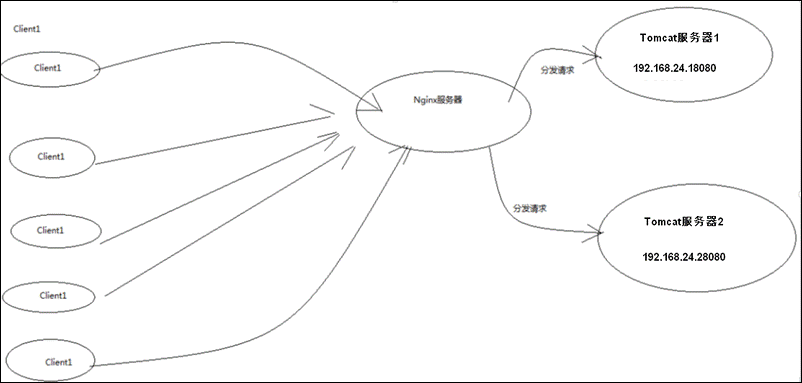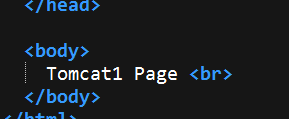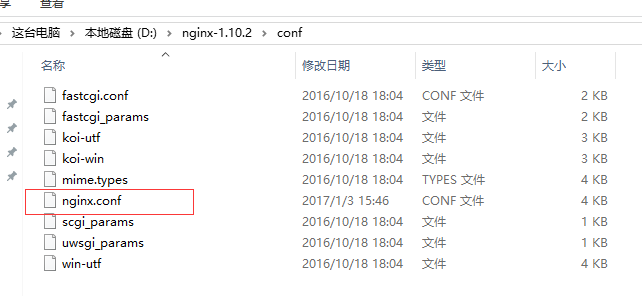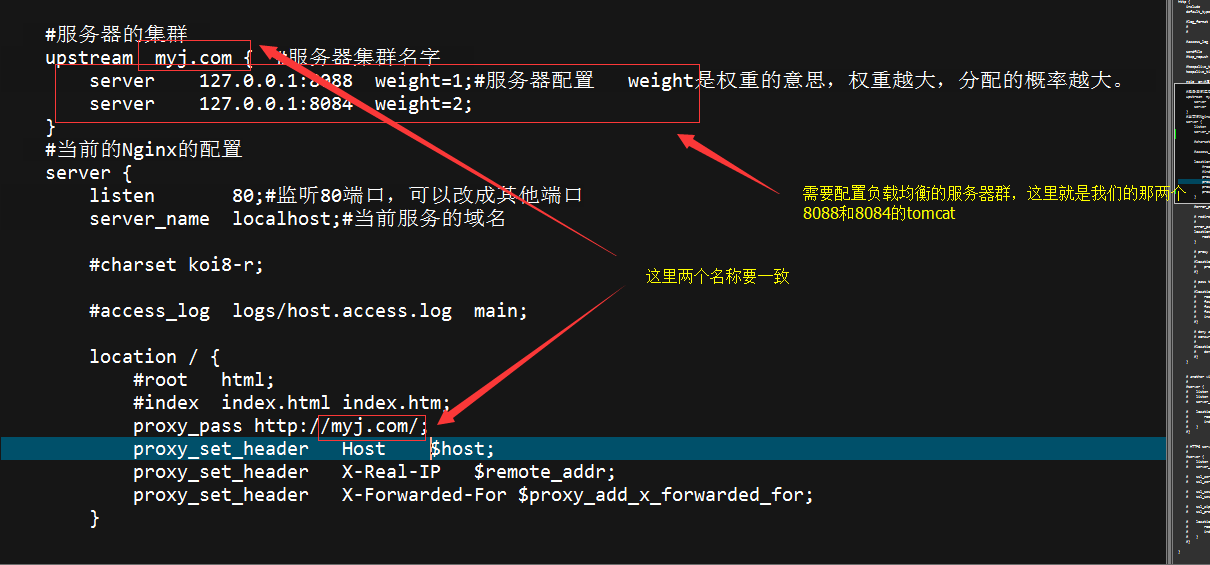nginx學習文件之二 配置負載均衡-windows配置負載均衡
阿新 • • 發佈:2019-02-10
windows配置負載均衡
nginx+tomcat負載均衡的意思大概如下圖:

所有請求先經過nginx伺服器,然後由nginx伺服器進行轉發,將請求根據配置需要分發給指定的tomcat伺服器
部署兩個tomcat 8088和8084
windows下部署兩個tomcat的過程參考
然後分別給兩個tomcat部署一個小應用,只是一個簡單的頁面index.jsp,表示區分是哪個tomcat下的
8088下的tomcat

8084下的tomcat

配置nginx.conf
實現nginx+tomcat負載均衡實際上只要配置nginx的nginx.conf配置檔案就可以了

在nginx.conf中的http裡新增
#伺服器的叢集
upstream myj.com { #伺服器叢集名字
server 127.0.0.1:18080 weight=1;#伺服器配置 weight是權重的意思,權重越大,分配的概率越大。
server 127.0.0.1:28080 weight=2;
}
再將http裡的server的location修改成
location / { #root html; #index index.html index.htm; proxy_pass http://myj.com/; proxy_set_header Host $host; proxy_set_header X-Real-IP $remote_addr; proxy_set_header X-Forwarded-For $proxy_add_x_forwarded_for; }
下面是修改過後的nginx.conf檔案
#user nobody; worker_processes 1;#工作程序的個數,一般與計算機的cpu核數一致 #error_log logs/error.log; #error_log logs/error.log notice; #error_log logs/error.log info; #pid logs/nginx.pid; events { worker_connections 1024;#單個程序最大連線數(最大連線數=連線數*程序數) } http { include mime.types;#副檔名與檔案型別對映表 default_type application/octet-stream;#預設檔案型別 #log_format main '$remote_addr - $remote_user [$time_local] "$request" ' # '$status $body_bytes_sent "$http_referer" ' # '"$http_user_agent" "$http_x_forwarded_for"'; #access_log logs/access.log main; sendfile on;#開啟高效檔案傳輸模式,sendfile指令指定nginx是否呼叫sendfile函式來輸出檔案,對於普通應用設為 on,如果用來進行下載等應用磁碟IO重負載應用,可設定為off,以平衡磁碟與網路I/O處理速度,降低系統的負載。注意:如果圖片顯示不正常把這個改成off。 #tcp_nopush on; #keepalive_timeout 0; keepalive_timeout 65;#長連線超時時間,單位是秒 gzip on;#啟用Gizp壓縮 #伺服器的叢集 upstream myj.com { #伺服器叢集名字 #Nginx是如何實現負載均衡的,Nginx的upstream目前支援以下幾種方式的分配 #1、輪詢(預設) #每個請求按時間順序逐一分配到不同的後端伺服器,如果後端伺服器down掉,能自動剔除。 #2、weight #指定輪詢機率,weight和訪問比率成正比,用於後端伺服器效能不均的情況。 #2、ip_hash #每個請求按訪問ip的hash結果分配,這樣每個訪客固定訪問一個後端伺服器,可以解決session的問題。 #3、fair(第三方) #按後端伺服器的響應時間來分配請求,響應時間短的優先分配。 #4、url_hash(第三方) #按訪問url的hash結果來分配請求,使每個url定向到同一個後端伺服器,後端伺服器為快取時比較有效 server 127.0.0.1:8088 weight=1;#伺服器配置 weight是權重的意思,權重越大,分配的概率越大。 server 127.0.0.1:8084 weight=2; } #當前的Nginx的配置 server { listen 80;#監聽80埠,可以改成其他埠 server_name localhost;#當前服務的域名 #charset koi8-r; #access_log logs/host.access.log main; location / { #root html; #index index.html index.htm; proxy_pass http://myj.com/; proxy_set_header Host $host; proxy_set_header X-Real-IP $remote_addr; proxy_set_header X-Forwarded-For $proxy_add_x_forwarded_for; } #error_page 404 /404.html; # redirect server error pages to the static page /50x.html # error_page 500 502 503 504 /50x.html; location = /50x.html { root html; } # proxy the PHP scripts to Apache listening on 127.0.0.1:80 # #location ~ \.php$ { # proxy_pass http://127.0.0.1; #} # pass the PHP scripts to FastCGI server listening on 127.0.0.1:9000 # #location ~ \.php$ { # root html; # fastcgi_pass 127.0.0.1:9000; # fastcgi_index index.php; # fastcgi_param SCRIPT_FILENAME /scripts$fastcgi_script_name; # include fastcgi_params; #} # deny access to .htaccess files, if Apache's document root # concurs with nginx's one # #location ~ /\.ht { # deny all; #} } # another virtual host using mix of IP-, name-, and port-based configuration # #server { # listen 8000; # listen somename:8080; # server_name somename alias another.alias; # location / { # root html; # index index.html index.htm; # } #} # HTTPS server # #server { # listen 443 ssl; # server_name localhost; # ssl_certificate cert.pem; # ssl_certificate_key cert.key; # ssl_session_cache shared:SSL:1m; # ssl_session_timeout 5m; # ssl_ciphers HIGH:!aNULL:!MD5; # ssl_prefer_server_ciphers on; # location / { # root html; # index index.html index.htm; # } #} }
主要配置的地方說明

重啟nginx測試
到nginx的安裝目錄下執行 nginx -s reload 重啟nginx

然後在瀏覽器上加上應用名訪問:localhost/testNginx
並按f5重新整理訪問


會發現,訪問的結果中會8088中的應用,也有8084中的應該用,而且8084被訪問到的機率會大一倍,這是因為在nginx.conf中配置服務群,8084的weight要大一些,所以被nginx分發到的請求概率也大一些,而且,當其中一個tomcat伺服器停掉之後,比如8084因為某種原因停掉,那麼nginx就會把請求都分發到另外一臺仍然正常工作的8088中。
